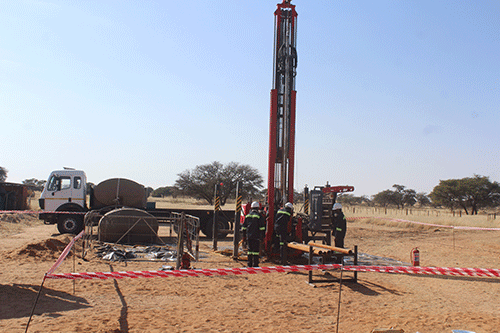The Aminuis Diaspora Community (ADC) has rejected the planned uranium mine in the constituency, saying the planned exploration will contaminate the already scared constituency’s agricultural land.
This follows the drilling of boreholes by Headspring Investments Project Wings, a subsidiary of Uranium One, which is a subsidiary of Rosatom, a Russian state-owned uranium exploration, mining and processing company.
“We are perplexed by the record of irregular activities which have been conducted by Headspring Investments until the revocation of its license permit,” said the Canadian-based group spokesperson Keyaya Riruako, the son of the late Ovaherero Paramount chief Kuaima Riruako.
“We are also questioning the liability and accountability of these ministerial departments that issued the water drilling, and uranium exploration permits/compliance certifications to the adverse Headspring Investments,” he questioned.
Riruako says what is more concerning is the lack of consultation and facilitation, including the communication breakdown between the Omaheke governor, Aminuis councillor, community chiefs and its constituents.
“We can no longer be silent to projects that would cause potential harm to our aquifers, health and environment for present and future generations at the expense of greed, selfishness and social irresponsibility,” he added.
Since the exploration of potential uranium deposits in Okahiokavapa and Omurambauandjombo, Aminuis constituency, Omaheke region, Riruako claimed the constituents have been kept in the dark for two years without proper consultations from relevant ministries.
“The whole constituency has been awoken after making the efforts to attend recent workshops comprising studies that were conducted by various experts within the geology and mining scope, specifically regarding uranium exploration, and including health and environmental effects,” he added.
According to Riruako, Canadian studies report that uranium exploration is a dangerous operation, with drastic side effects for people who are exposed to chemical toxins and radioactivity, which causes nephrotoxic effects and lung cancer.
“These uranium effects are accessible to humans, particularly, miners and the environment, because it can be exposed via exploration drilling and contaminated water,” he said.
“All the Aminuis residents are farmers who rely on underground drinking fresh water for farming purposes; therefore, we cannot afford to compromise our agricultural land to be contaminated by the detrimental uranium exploration without compromising our future livelihoods,” he added.
Riruako said they strongly agree with the Stampriet Aquifer Uranium Mining (Saum) committee chairperson, Divan Oppermann, who is concerned about the unproven “safe” mining practices that are being conducted by the uncooperative, Russian State-owned Headspring Investments Ltd.
“We will never reject any development that is being brought forth to our region, but if it is not safe nor healthy to our environment and locals, then we are not permitting its operations,” he stressed.
He said, as inhabitants, they are disappointed in the agricultural ministry, mines ministry as well as environment ministry for having grated the Headspring Investment water drilling, and uranium exploration permits/compliance certifications, without proper consultations with our community members, including geological and environmental experts.
“Why would the government implement policies that allow foreigners to bargain and bid on projects that are jeopardising the environment of our communal land?”
“As citizens of the land of the brave, we ought to be enlightened about the abovementioned affairs taking place in our constituency, especially of the land and environment – and most importantly, the water is going to be left in a detrimental state,” he said.


